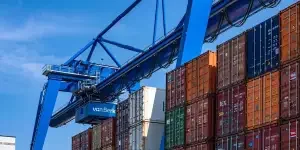As ecommerce customers have increasingly higher standards for accurate, on-time deliveries, shipping and warehousing standards are becoming critical for competitive ecommerce brands. Your fulfillment center or warehouse needs to adhere to product safety and compliance guidelines, this is especially true for brands handling goods regulated by the US Food and Drug Administration (FDA).
FDA shipping validation is a vital aspect of logistics for ecommerce brands that deal with pharmaceuticals, medical devices, food products, supplements, or cosmetics. If your brand outsources fulfillment to a 3PL, you’ll need to vet that they follow the following best practices.
What is FDA Shipping Validation?
FDA shipping validation refers to the process of ensuring that products regulated by the FDA are stored and transported under conditions that maintain their safety, quality, and efficacy. For example, temperature-sensitive drugs require specific storage conditions, while perishable food items must comply with the FDA’s Food Safety Modernization Act (FSMA) rules. Validation ensures these conditions are consistently met during storage and transit.
Warehouses used in the supply chain must adhere to specific certification and operational standards to meet FDA requirements. These certifications often include Good Manufacturing Practices (GMP) and Good Distribution Practices (GDP), ensuring warehouses maintain sanitary conditions, proper documentation, and suitable handling procedures.
Complying with warehouse certification requirements can enhance product integrity, customer trust, and regulatory adherence.
Key FDA Certification Requirements for Warehouses
1. Facility Compliance
Warehouses must comply with FDA guidelines for hygiene, layout, and design. Facilities should minimize contamination risks by implementing:
- Proper ventilation and pest control
- Dedicated storage zones for regulated products.
- Robust cleaning protocols.
For food storage, the FSMA requires warehouses to have preventive controls in place to avoid contamination and mishandling.
2. Temperature Control Systems
Products like biologics, vaccines, and certain foods require controlled temperatures. Warehouses must install validated systems for temperature and humidity monitoring, ensuring that thresholds are consistently met, and deviations are promptly addressed. Alarm systems and backup generators are also necessary for emergencies.
3. Quality Management System (QMS)
A robust QMS is crucial for tracking compliance and managing risks. This includes:
- Standard Operating Procedures (SOPs) for handling, storing, and shipping.
- Proper training for warehouse staff.
- Documented audits and validations.
The QMS should align with FDA’s 21 CFR Part 11 regulations for electronic records and signatures.
4. Packaging and Labeling Standards
Warehouses must ensure that packaging is tamper-evident, appropriate for the product, and in compliance with FDA labeling requirements. This is especially critical for medical devices and pharmaceuticals.
5. Inventory Traceability
Warehouses must implement systems for tracking inventory to comply with the Drug Supply Chain Security Act (DSCSA) for pharmaceuticals or FSMA rules for food. This includes serialization and detailed logs of all product movements.
If you’re curious about effective warehouse standardization, the 5s system is a tried and tested way to maximize warehouse efficiency and uphold high-quality standards for fulfillment.
Who is Responsible FDA Compliance When You Outsource Fulfillment to a 3PL?
When an ecommerce brand outsources its logistics operations to a third-party logistics provider (3PL), both the brand and the 3PL share responsibility for FDA compliance. Here’s how FDA certification and compliance typically work in such a partnership.
Responsibilities of the 3PL
The 3PL, as the entity handling the storage, transportation, and sometimes fulfillment of FDA-regulated goods, is directly responsible for ensuring that its facilities and operations meet FDA requirements. This includes:
- Facility Certification: The 3PL must maintain necessary certifications or compliance with FDA standards. This includes, Good Manufacturing Practices (GMP) for handling pharmaceuticals or cosmetics; Food Safety Modernization Act (FSMA) compliance for food and dietary supplements; Good Distribution Practices (GDP) for temperature-sensitive or high-risk products.
- Operational Standards: Implement validated systems for temperature control, pest control, and sanitation. Maintain records to demonstrate compliance with FDA requirements. Ensure proper training of employees to handle FDA-regulated products.
- Documentation and Traceability: The 3PL is responsible for keeping accurate records of product storage, handling, and shipping, ensuring traceability for audits or recalls under regulations like the Drug Supply Chain Security Act (DSCSA).
Responsibilities of the Brand
Even when outsourcing logistics, the brand retains ultimate accountability for ensuring compliance with FDA regulations for its products.
- Vendor Due Diligence: The brand must verify that the 3PL is certified and fully compliant with applicable FDA regulations. Conduct audits and review the 3PL’s certifications, Standard Operating Procedures (SOPs), and history of compliance.
- Product-Specific Compliance: For example, if a brand produces a temperature-sensitive drug, it must ensure the 3PL has validated cold chain capabilities and adheres to FDA standards.
- Recordkeeping and Oversight: The brand must maintain records of its agreements and compliance monitoring activities with the 3PL. Ensure the 3PL’s compliance processes align with FDA requirements for electronic records under 21 CFR Part 11.
- Reporting Obligations: If a compliance issue arises, such as a recall or product quality issue, the brand may need to collaborate with the 3PL but will likely bear the responsibility of reporting to the FDA.
Remember accountability stays with the brand. While the 3PL executes the operational side of compliance, the FDA holds the brand liable for ensuring its supply chain adheres to regulations. This means the brand must have robust agreements and monitoring systems in place.
Bottom Line: How to Ensure Your Warehouse is Quality Compliant
Whether you outsource fulfillment or not, the responsibility for FDA compliance remains with the brand itself. Make sure you track your in-house warehouse team or fulfillment provider regularly to ensure GMP or GDP compliance.
- Regular risk assessments—identify potential hazards in the supply chain and implement preventive measures.
- Invest in technology—implement warehouse management systems (WMS) with built-in compliance features.
- Conduct audits and inspections—routine checks, done regularly, will help ensure ongoing compliance.
Meeting FDA shipping validation requirements is not just about avoiding penalties; it’s about protecting consumers and strengthening your brand’s reputation. By focusing on proper warehouse certification, e-commerce brands can ensure their products are delivered safely, maintaining the trust and loyalty of their customers.
Source from DCL Logistics
Disclaimer: The information set forth above is provided by dclcorp.com independently of Alibaba.com. Alibaba.com makes no representation and warranties as to the quality and reliability of the seller and products. Alibaba.com expressly disclaims any liability for breaches pertaining to the copyright of content.



